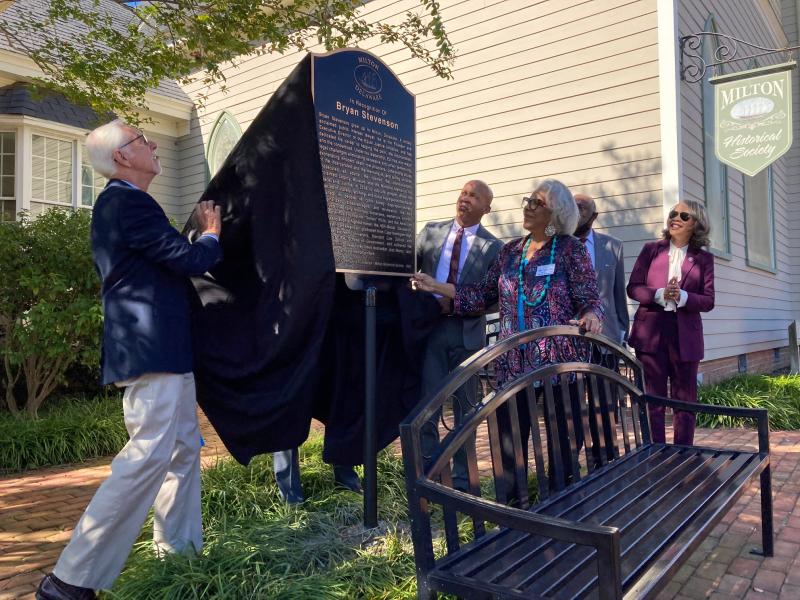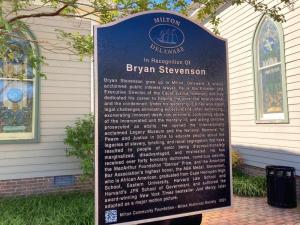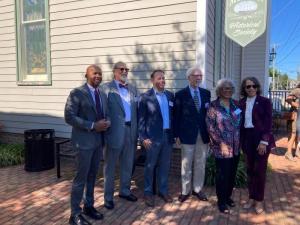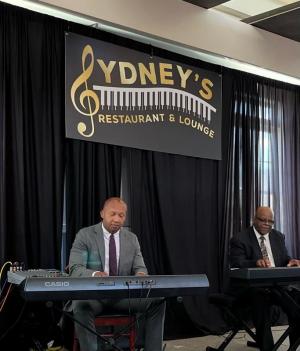Milton honors Bryan Stevenson

Bryan Stevenson’s life has included a lengthy list of accolades: New York Times best-selling author, one of Time’s most influential people, 40 honorary degrees and a MacArthur genius grant. In 2019, Stevenson was the subject of “Just Mercy,” an American biographical legal drama. Now that list includes a historic plaque in his hometown of Milton.
Stevenson was on hand at a small ceremony Oct. 8, to unveil the plaque at the Lydia Cannon Museum on Union Street. The event was attended by Stevenson’s family, public officials and members of the Milton Community Foundation and the Milton Historical Society, which hosted the event.
“I’m really moved to be here,” Stevenson said. “I’ve received a lot of awards. I’ve received a lot of recognition. But there’s something special about being back home.”
A graduate of Cape Henlopen High School, Stevenson attended Harvard Law School and went on to found the Equal Justice Initiative in Montgomery, Ala. Under his leadership, the EJI has won major legal challenges to eliminate excessive or unfair sentencing, exonerated innocent death row prisoners, confronted abuse of those incarcerated and the mentally ill and aided children prosecuted as adults. Stevenson was instrumental in creating the two historically important sites opened in 2018 - the Legacy Museum and the National Memorial for Peace and Justice. The sites were created to educate people about the legacies of slavery, lynching and racial segregation.
Stevenson grew up in Milton during a time when there were still segregated schools, and was part of the first racially integrated class at H.O. Brittingham Elementary School.
“I remember the excitement we had all across this town when we finally got to go to school with all the other children at that beautiful brick building. It doesn’t seem like much, but back in those days it was the finest building you can imagine,” Stevenson said. “We saw teachers we only saw at the colored schools walking down the halls and they held their heads up high. There was this sense of community. And one of the things I loved about growing up here is you could not get away from community.”
He said the Milton community helped instill in him the ability to dream big. And while Stevenson was thrilled with the honor, he said work still needs to be done to have a more just society. He said the United States still has the highest rate of incarceration in the world and that the legal system “still treats you better if you are rich and guilty than if you're poor and innocent.
“We’ve created conditions where too many people are living in the margin,” he said. “I’m persuaded that there is something better waiting for us in this country. There’s something that feels more like freedom. It feels more like justice. It feels more like equality. But we can’t get there if we don’t create a common vision of community.”
He said he is proud to come from a small town like Milton and that where you come from should not limit your aspirations.
“I am the product of hope. My parents, my people taught us to be hopeful. We did not know what integration was going to be like but we were hopeful,” Stevenson said.
Milton Community Foundation commissioned the plaque in early 2021, but an unveiling ceremony was delayed to this year due to the COVID-19 pandemic. In addition to the plaque, the foundation gave $1,000 to the Bryan Allen Stevenson School of Excellence and $5,000 to the Equal Justice Initiative.
Tom Arkinson, vice president of Milton Community Foundation, said, “It’s inspirational to know that a native son of Milton has done so much to address inequalities in the justice system. He is a role model for all of us, especially Milton’s youth. The appreciation and pride this community has for Mr. Stevenson is overwhelming and it does need to be shared with everyone who comes to town.”
Ryan Mavity covers Milton and the court system. He is married to Rachel Swick Mavity and has two kids, Alex and Jane. Ryan started with the Cape Gazette all the way back in February 2007, previously covering the City of Rehoboth Beach. A native of Easton, Md. and graduate of Towson University, Ryan enjoys watching the Baltimore Ravens, Washington Capitals and Baltimore Orioles in his spare time.
























































